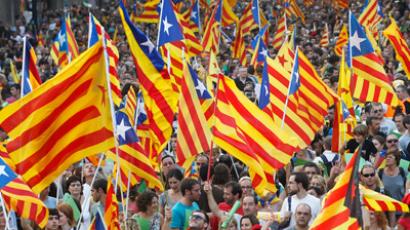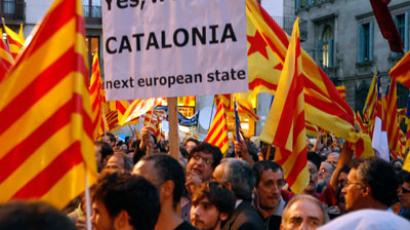Catalonia votes: President-elect to mull secession from Spain
Catalonians are voting in the new parliamentary elections that could be the first step towards a referendum on independence from Spain. The incumbent president has called for a snap election, and promised to hold a vote on secession if reelected.
Catalonians cite financial troubles as one of the main reasons for wanting to secede from Spain. Catalans started voting at 9:00am local time (08:00 GMT). Polling stations across the region will close their doors at eight in the evening (1900 GMT) with exit polls expected to be announced shortly afterwards.More than 5 million people are eligible to vote for candidates for the 135-seat Catalan parliament.Recent polls showed that a majority of Catalans strongly support, and would vote for, parties that want the region to become independent from Spain.By 1:00pm local time (1200 GMT), the voter turnout was reportedly estimated to be higher than any of the previous seven elections since 1988, the Catalan government said.
Catalan President Artur Mas and his center-right Convergence and Union party (CIU) is predicted to win 62 to 64 seats in Parliament. But in order to hold a majority in regional assembly, his coalition needs at least 68 seats.Currently, Catalonia is paying Madrid around 16 billion euro a year more in taxes than it gets back from the central government, which has insisted that public services endure austerity cuts. These measures are in turn blamed as a cause of the Catalonia region's deficit and debt issues. Artur Mas, president and leader of the center-right Convergence and Union Party (CIU) has called for an early election in September after Barcelona and Madrid failed to reach agreement on a new tax scheme.
The Catalan government asked for the right to set and collect the region's tax rates, instead of sending the money to Madrid.Catalonia currently owes around 40 billion euro in debt, which has forced regional authorities to introduce spending cuts in healthcare and education.
Catalonia is an autonomous region of Spain. It consists of four provinces: Barcelona, Girona, Lleida, and Tarragona. Catalonia has a population over 7.5 million, and its capital is Barcelona.
“The economic crisis in southern Europe has been a catalyst of this movement. And people in Catalonia feel they have the capital and resources to be better off if we are not part of Spain and there is a lot of economic research that shows this,” for CIU Party spokesperson Marc Guerrero told RT. Catalonia is one of Spain’s wealthiest regions, producing one-fifth of the country’s economic output. “This is not fair, we are the ones doing our best economically and we cannot have all the weight of the austerity measures when it is the central government that is doing all the spending and not in the best way,” Guerrero added.Catalonian anger at Madrid’s policies sparked the country's biggest separatist rally since the 1970s, with 1.5 million people coming out on September 11, Catalonian National Day. The mass protest led Mas to shift his party's official position on independence to "Let the people decide."
Catalan flags can now be seen hanging from balconies throughout Barcelona, reflecting a growing desire for regional autonomy and a drive to break away the central government, Andrew Farmer reported from the region. However, the proposed referendum violates the Spanish constitution, and secession from Spain could also mean dropping out of the European Union. Anti-separatists believe it could do more harm than good.“Separatism for Catalonia would be an economic disaster. Multinational companies locate in Barcelona for access to the Spanish market and being in the EU. That would be lost. And uncertainty is the last thing the economy needs during this current economic crisis,” Catalonia’ Citizens Party spokesperson Jordi Canas told RT.Polling suggests that Artur Mas will win reelection, but may not win a majority of votes. Either way, unemployment, financial instability and the austerity measures imposed by Madrid have led 46.4% of Catalans to support independence, according to a recent survey. That number is twice as many as before the ongoing financial crisis began four years ago.Some prominent figures in Spain argue that secession is illegal, and could lead to a Spanish civil war.
The president of the Spanish Military Association, Colonel Leopoldo Sánchez, suggested to Dutch television channel Niewsur that Spain has the right “to declare a state of war” over threats of separatism.Catalan members of parliament condemned the rhetoric, calling it “inconceivable,”“fascistic” and “war-time arguments.”
No matter the outcome, the talk of secession could trigger a deterioration of relations between Barcelona and Madrid, political analyst Paolo Raffone told RT. “Of course the constitution does not allow separatism, the outcome is quite unpredictable. I would say that whatever the outcome will be at the end, the relationship between Barcelona and Madrid will be at strain and they risk even to become violent,” he said. “Catalonia is, anyway, key industrial area in Spain and it is the only one that can eventually compete itself with the rest of Europe,” Raffone added.














